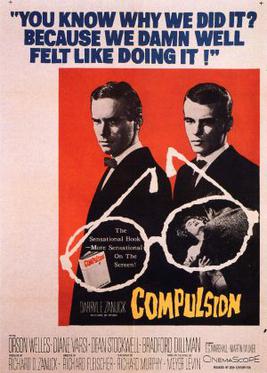***Out In The 1950s Film Noir Night-
Compulsion
From The Pen Of Frank Jackman
DVD Review
Compulsion, starring Bradford Dillman, Dean Stockwell, Orson Welles, directed
by Richard Fleischer, 1959
The Jazz Age, the time, the
decade or so, right after the war, World War I one if anybody is asking, was a weird
time in America in some respects. That was the careless, crime-ridden “war on
alcohol” age made famous by the like of Ernest Hemingway and F. Scott
Fitzgerald, especially the latter for his take on American upward mobility with
his unforgettable character Jay Ganz trying to climb up the social anyway he
could, no matter the body count, in The Great Gatsby. Of course that was fiction, fiction though that cut to the core, cut to
the core like the film under review, Compulsion, was fiction although
based on the infamous actions of Leopold and Loeb in Chicago in the 1920s.
Apparently our fictionalized lead
characters here, Artie and Judd, two young men, boys really, from wealthy
Chicago circumstances had spent too much of their spare time reading too many
German philosophers, too much Nietzsche, too seriously, especially those interested in creating
a society led by “supermen,” the elite guided by no other criterion except pure
rationality. No emotional attachments need apply. And to prove that thesis, to try it out in
practice, the pair crudely bludgeon some kid in park and depose of him in culvert
after kidnapping him. They assume after such heroics that they have passed
beyond the pale of mere mortals and have proven their superiority point. Except
for the little problem of those damn glasses that Judd somehow left behind at
the crime scene and that did them in posthaste. So from supermen they turned into,
well, low- life cellmates in a trial for their lives.
While the drama here is driven
for a while by trying to corral the pair, trying to dissect their weird
motivations, the real claim to fame of this film should be as a rather powerful
argument against the death penalty. Certainly the heinous crime they committed was
in another age death-penalty worthy but as powerfully articulated by Jonathan
Wilk (Orson Welles), as their attorney, that barbaric form of punishment did
nothing to deter the mad, the crazy and the socially isolated and offended against
our evolving standard of civility. And so powerful was Mister Wilk’s presentation
that the judge actually gave both men life sentences. Life sentences to stew in
their own juices over their views of the word and maybe change their perspectives
around mere mortals. And those hardened inmates at Joliet will see to that. 
No comments:
Post a Comment